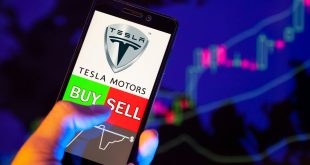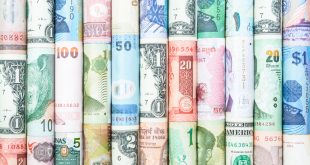Countries that depend on the region’s rich supply of energy, wheat, nickel and other staples could feel the pain of price spikes.
After getting battered by the pandemic, supply chain bottlenecks and price jumps, the global economy is expected to be sent on one more unpredictable course by an armed clash this time in Europe.
Even before the Kremlin ordered Russian troops into separatist territories of Ukraine on Monday, the tension had taken a toll. The promise of punishing sanctions in return by President Biden and the potential for Russian retaliation had already pushed down stock returns and driven up gas prices.
Oil prices surged along with tensions over a conflict, and stocks dropped around the world, including in Russia. An outright attack by Russian troops could cause dizzying spikes in energy and food prices, fuel inflation fears and spook investors, a combination that threatens investment and growth in economies around the world.
However harsh the effects, the immediate impact will be nowhere near as devastating as the sudden economic shutdowns first caused by the coronavirus in 2020. Russia is a transcontinental behemoth with 146 million people and a huge nuclear arsenal, as well as a key supplier of the oil, gas and raw materials that keep the world’s factories running. But unlike China, which is a manufacturing powerhouse and intimately woven into intricate supply chains, Russia is a minor player in the global economy.
Italy, with half the people and fewer natural resources, has an economy that is twice the size. Poland exports more goods to the European Union than Russia.
Russia is incredibly unimportant in the global economy except for oil and gas. It’s basically a big gas station. An underground gas storage facility in Kasimov, east of Moscow. Russia supplies nearly 40 percent of Europe’s natural gas.
A closed gas station can be crippling for those who depend on it. The result is that any economic damage will be unevenly spread, intense in some countries and industries and unnoticed in others.
Europe gets nearly 40 percent of its natural gas and 25 percent of its oil from Russia, and is likely to be walloped with spikes in heating and gas bills, which are already soaring.
Natural gas reserves are at less than a third of capacity, with weeks of cold weather ahead, and European leaders have already accused Russia’s president, Vladimir V. Putin, of reducing supplies to gain a political edge.
As for food prices, which have climbed to their highest level in more than a decade largely because of the pandemic’s supply chain mess, according to a recent UN report. Russia is the world’s largest supplier of wheat, and together with Ukraine, accounts for nearly a quarter of total global exports. For some countries, the dependence is much greater. That flow of grain makes up more than 70 percent of Egypt and Turkey’s total wheat imports.
This will put further strain on Turkey, which is already in the middle of an economic crisis and struggling with inflation that is running close to 50 percent, with skyrocketing food, fuel and electricity prices.
And as usual, the burden falls heaviest on the most vulnerable. Poorer people spend a higher share of incomes on food and heating. Ukraine, long known as the “breadbasket of Europe,” actually sends more than 40 percent of its wheat and corn exports to the Middle East or Africa, where there are worries that further food shortages and price increases could stoke social unrest.
Lebanon, for example, which is experiencing one of the most devastating economic crises in more than a century, gets more than half of its wheat from Ukraine, which is also the world’s largest exporter of seed oils like sunflower and rapeseed.
On Monday, the White House responded to Mr. Putin’s decision to recognize the independence of two Russian-backed territories in the country’s east by saying it would begin imposing limited sanctions on the so-called Donetsk and Luhansk People’s Republics. Jen Psaki, the White House press secretary, said Mr. Biden would soon issue an executive order prohibiting investment, trade and financing with people in those regions.
Analysts watching the unfolding conflict have mapped out a range of scenarios from mild to severe. The fallout on working-class families and Wall Street traders depends on how an invasion plays out: whether Russian troops stay near the border or attack the Ukrainian capital, Kyiv; whether the fighting lasts for days or months; what kind of Western sanctions are imposed; and whether Putin responds by withholding critical gas supplies from Europe or launching insidious cyberattacks.
In the United States, the Federal Reserve is already confronting the highest inflation in 40 years, at 7.5 percent in January, and is expected to start raising interest rates next month. Higher energy prices set off by a conflict in Europe may be transitory but they could feed worries about a wage-price spiral.
Possible shortages of essential metals like palladium, aluminum and nickel, also fueling inflation fears; creating another disruption to global supply chains already suffering from the pandemic, trucker blockades in Canada and shortages of semiconductors.
The price of palladium, for example, used in automotive exhaust systems, mobile phones and even dental fillings, has soared in recent weeks because of fears that Russia, the world’s largest exporter of the metal, could be cut off from global markets. The price of nickel, used to make steel and electric car batteries, has also been jumping.
It is too early to gauge the precise impact of an armed conflict, but is a very, very serious development. Markets await a number of scenarios on the table and are following the developments of the situation minute by minute. The West has taken steps to blunt the impact on Europe if Mr. Putin decides to retaliate. The United States has ramped up delivery of liquefied natural gas and asked other suppliers like Qatar to do the same.

 Noor Trends News, Technical Analysis, Educational Tools and Recommendations
Noor Trends News, Technical Analysis, Educational Tools and Recommendations




